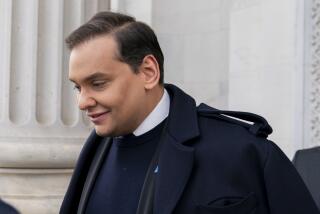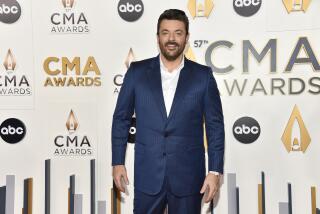Young Rejects Plea-Bargain in Mail Fraud Case
Lawyers defending former Norwalk Assemblyman Bruce E. Young announced Tuesday that he has rejected the possibility of any plea-bargain and plans instead to prove that he did “absolutely nothing illegal” during a lengthy association with convicted political corruption figure W. Patrick Moriarty.
Moriarty, an Orange County fireworks manufacturer who is now serving a seven-year prison term, will be the chief government witness against Young, who lobbied for pro-fireworks legislation on behalf of Moriarty in 1981 while a Democratic assemblyman.
Young faces 28 counts of mail fraud for allegedly failing to report income from Moriarty and a cable television company, Falcon Communications.
Jury selection was completed Tuesday, and opening statements are scheduled to begin today.
Young’s lawyers, George Walker and Alan Dressler, both of San Francisco, said during a break in the proceedings that they never seriously considered the possibility of a plea-bargain with the government and disputed a report by U.S. District Judge Dickran Tevrizian last week that they had actually contacted the judge’s office with a request that he sit in on plea-bargain talks.
“I believe the judge misunderstood things. I did not contact his office,” Walker said. “As I understand it, (Chief Assistant U.S. Atty. Richard E.) Drooyan contacted the office. We listened to the government and reported their offer (an agreement permitting Young to plead guilty to four counts of mail fraud) back to Mr. Young, who told us to proceed with the case. The discussions were never serious.”
Drooyan, disputing Walker’s account, said he had never contacted Tevrizian’s office on any matter relating to the Young case. He added, “They asked us what we wanted to settle the case and we told them.”
Only an hour after the jury was picked Tuesday, Drooyan accused one of Young’s former legislative colleagues of helping the former assemblyman by changing his story on the witness stand.
The charge was made by Drooyan during a hearing on whether the government may introduce evidence that Young engaged in a “pattern of deception and concealment” to thwart the corruption probe that led to his indictment last August.
To make his point, Drooyan called Orange County attorney Ronald Cordova, a former Democratic assemblyman who roomed with Young in Sacramento.
Drooyan told Tevrizian that he expected Cordova’s testimony to help show that Young had provided false information to Cordova to unwittingly pass on to the Long Beach Press-Telegram for a 1983 article about Young’s financial involvement with Moriarty.
But when Cordova took the stand, he testified that he could not recall whether Young was the source of the information or not.
At issue were statements the Press-Telegram attributed to Cordova that Young had purchased an option on a Moriarty condominium project in 1982, and that Young had failed to report stock holdings in the Bank of Irvine in 1980 because he had sold the stock at a loss. The government says there was no option and contends that Young made money on the stock.
Drooyan was obviously surprised when Cordova testified that he did not recall making any comment to the newspaper about the sale of bank stock. Cordova, who represented Young during a 1983 divorce settlement with his first wife, added that the information about the condominium could have come from either Young or his first wife, JoAnn.
“I don’t believe Mr. Cordova’s testimony,” Drooyan said. “He is backing off statements he made to the paper and to me. . . . Frankly, I can’t use him as a witness now. He’s having recall problems.”
Tevrizian, telling Drooyan that his comments were “editorial,” said he would decide whether Cordova’s testimony was believable or not before he rules today on the question of whether the government can call Cordova to the stand in front of jurors--a possibility that appeared remote in view of the lawyer’s comments.
More to Read
Sign up for Essential California
The most important California stories and recommendations in your inbox every morning.
You may occasionally receive promotional content from the Los Angeles Times.









